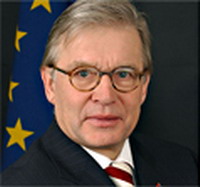Human Rights Watch: Russia abuses in Chechnya inadequate

The Council of Europe has yielded to pressure from Moscow and has failed to respond to documented Russian civil liberties violations in Chechnya, the head of Human Rights Watch said Wednesday.
Kenneth Roth, executive director of the New York-based rights group, said European institutions have been inefficient in defending civil liberties despite countless monitoring bodies set up solely for this purpose.
The council, the continent's premier human rights body, can order Russia to amend its laws to prevent human rights abuses, but has no efficient follow-up mechanism to enforce sanctions on Moscow in case of continuing violations.
"The clearest example is the Council of Europe's striking failure to respond effectively to the continuing, pervasive impunity for grave human rights violations in Russia's Chechnya," Roth told the council's parliamentary assembly, a group of 315 European lawmakers, during a debate on the state of human rights and democracy in Europe.
"The problem cannot be chalked up to a lack of information about conditions on the ground. A range of Council of Europe bodies have extensively documented atrocities in Chechnya. ... Shockingly, Russia has faced no adverse consequences," Roth said.
The council's anti-torture committee said in a report earlier this year that Chechnya continues to be plagued by torture and unlawful detentions, with human rights violations rarely investigated. The European Court of Human Rights, which is administered by the council, has blamed the Russian government for the disappearance and presumed killing of several people in Chechnya, and has ruled against Moscow in other cases concerning fighting in the restive province in the last 12 years.
But Roth said there has been little concrete action to curb these human rights abuses. He blamed pressure exerted by Russia - a Council of Europe member state - and the council's decision-making system, which requires unanimity to act against any of its 46 members.
The council acts mostly by peer pressure, and its responses to human rights crises are often slow. Russia has faced no sanctions for human rights abuses in Chechnya, apart from being ordered to pay several hundred thousand euros (dollars) to relatives of some of the victims.
"A system that allows any single member state to stand in the way of the defense of human rights is a recipe for weakness. Europe allows itself to be led by its most reluctant members," Roth said.
Rene van der Linden, chairman of the parliamentary assembly, said that while the council has no permanent presence in Chechnya due to security concerns, monitoring of the province continues from the outside.
"I cannot accept that this has to do with pressure from Russia," he said.
Subscribe to Pravda.Ru Telegram channel, Facebook, RSS!


